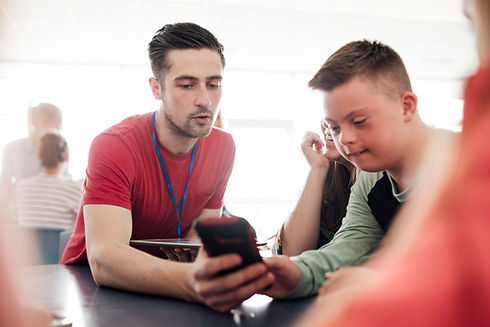DOES MY CHILD NEED A MENTOR?


"Mentorship is an eye that is not judgmental, soft-hearted that boosts the mentee's confidence, and encourages him/her to believe in himself/herself."
- Euginia Herlihy

what is the purpose of mentoring?
Let's face it. Kids today have more on their plates than we did when we were their age. News of constant bullying, drug use, and violence in neighborhoods and schools seem to scream at them daily. The pandemic has taken its toll on the mental health of everyone, and while adults try to cope, children are left isolated and lost.
The Hope Center has shifted our focus to more 1:1 mentoring so that our mentors can be that listening ear, encourager, and cheerleader our kids desperately need.
how does it work?
At our monthly events, we have such a great time with the students. We introduce them to new friends, activities, and team-building exercises and give them an opportunity to voice their opinions on things that matter to them. In addition to these group sessions, we match a mentor with a mentee for a 1:1 session. These sessions are held during our monthly events, but mentors and mentees are also encouraged to communicate with one another at least three times a month by phone, text, or email. The mentor checks in to see how their mentee is doing and if they have anything they want to discuss, including situations at home, at school, or with their friends. All conversations are kept in confidence so that mutual trust is built.
how do i know if my child needs a mentor?
Your child may not come to you and tell you that they need a friend, so how will you know if mentoring is right for them? As a parent or caregiver, you pick up on your child's habits and mannerisms. Are they alone a lot? Would they rather play video games than hang out with friends or make new friends outside? Are they quiet and withdrawn? How are their grades?
While these may not all indicate a need for a mentor, chances are that having a mentor wouldn't hurt. Here are some interesting stats:

55%
More likely to graduate from college
46%
less likely than their peers to start using illegal drugs
81%
More likely to be involved in sports or extracurricular activities
52%
less likely than their peers to skip a day of school
130%
More likely to hold leadership positions
Source: Mentoring.org 2018

what age group do you mentor?
We focus on students in grades 3-12. The reason is that these kids are in a transition period. They are coming out of elementary school and finding new independence. They eagerly discover new things and ideas and prepare to spread their wings. As exciting as this is for them, it can be very confusing. They are still a child but desire to have their voice heard. They want to fit in with their peers. They don't want to be bossed around and show signs of rebellion when they don't get their way.
This starts at home and amplifies at school. Students push back against authority and feel like the rules don't apply to them, then they begin to experience difficulty at school with teachers, grades, and friends. Think about when you were their age. Was it an awkward time for you? Did you hate being told what to do all the time with the answer of "I said so, that's why!" constantly?
We want to give kids a place to be heard. We want to offer them a place to go where they have a friend to talk to about things on their mind. We want to show them that it's ok to question things they don't understand but do it in a respectful manner.
While the focus is on preteens, that doesn't mean that there is no room for older teens. If you feel like your teen could use some encouragement, we'd love to have them. We can give them a sense of belonging and ownership as they volunteer with us and participate in the activities. We will get them paired with a mentor that matches them and leads them to success.
who are the mentors?
Our mentors are hand-selected by our board of directors. They are fully vetted through interviews and background checks. Some of these mentors may have a past that involved drug or alcohol abuse or other situations. However, those past experiences have brought them to a place to be able to help those who are struggling and to see the warning signs in kids so that they can be dealt with early before it becomes an issue. Parents and caregivers will be introduced to the mentor and have their contact information. Also, 1:1 meetings with children will not be in an isolated place. We may on occasion travel to ballgames together or go out for ice cream or dinner, but there will always be others in our team that will be on hand. We also get parent or guardian permission prior to any outside outings or events.
IS YOUR CHILD READY FOR A MENTOR?
We're excited to have your child join our mentoring program at The Hope Center.
To register your child in our mentoring program, please click here.
